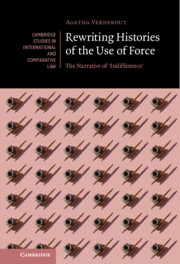Book contents
- Rewriting Histories of the Use of Force
- Cambridge Studies in International and Comparative Law: 160
- Rewriting Histories of the Use of Force
- Copyright page
- Contents
- Foreword
- Acknowledgements
- Abbreviations
- Introduction
- Part I The Use of Force in Nineteenth-Century Doctrine
- Part II The Use of Force in Nineteenth-Century Practice
- Part III The Narrative of Indifference in the Twentieth Century
- 8 Disciplinary Beliefs about International Law and the Narrative of Indifference
- 9 The Emergence of the Narrative of Indifference in the Interwar
- Conclusion of Part III
- Conclusion
- Bibliography
- Index
- Cambridge Studies in International and Comparative Law
Conclusion of Part III
from Part III - The Narrative of Indifference in the Twentieth Century
Published online by Cambridge University Press: 10 September 2021
- Rewriting Histories of the Use of Force
- Cambridge Studies in International and Comparative Law: 160
- Rewriting Histories of the Use of Force
- Copyright page
- Contents
- Foreword
- Acknowledgements
- Abbreviations
- Introduction
- Part I The Use of Force in Nineteenth-Century Doctrine
- Part II The Use of Force in Nineteenth-Century Practice
- Part III The Narrative of Indifference in the Twentieth Century
- 8 Disciplinary Beliefs about International Law and the Narrative of Indifference
- 9 The Emergence of the Narrative of Indifference in the Interwar
- Conclusion of Part III
- Conclusion
- Bibliography
- Index
- Cambridge Studies in International and Comparative Law
Summary
After having evidenced the discrepancy between the past and modern discourse about the use of force, the third and final part of this book aimed at pin-pointing the nature, the apparition, and the raison d’être of the narrative of indifference in twentieth century international legal scholarship. It upheld the hypothesis according to which today’s commonly accepted history of the use of force finds its roots in the beliefs that underlie the identity of international law as a discipline confronted with the events of the World War I and immediate post-war. Guided by the work of Jan Assmann and Claude Lévi-Strauss, the demonstration was carried out in two main steps. The first, Chapter 8, wished to verify if and to what extent the narrative of indifference could, indeed, be considered to be an emanation of the discipline’s assumptions about itself and others. In this context, we saw that the common account of the history of the use of force in international law mimics, in several aspects, the discipline’s more general discourse about itself and about the power of international law to order international relations and bring progress to humanity. The purpose of Chapter 9 was, then, to interrogate the social function of the narrative of indifference and of the exaggerated contrast between pre- and post-war era that it upholds. It has been argued that this traditional account is linked to the events of the World War I, and that in at least two interconnected ways: (i) as a result of the negative experience caused by the outburst of the war and the concomitant need to salvage the little credibility international law had left by finding another culprit and (ii) as a result of the positive experience caused by the adoption of the Covenant of the League of Nations and the conviction that international law had finally been given the means of its ambitions.
- Type
- Chapter
- Information
- Rewriting Histories of the Use of ForceThe Narrative of ‘Indifference', pp. 314 - 319Publisher: Cambridge University PressPrint publication year: 2021



